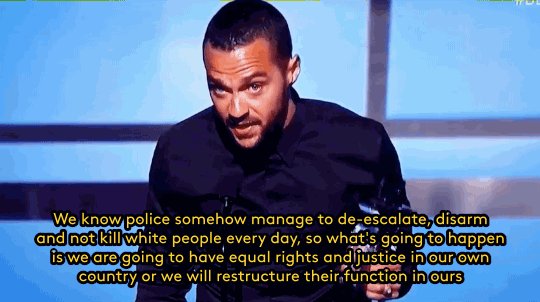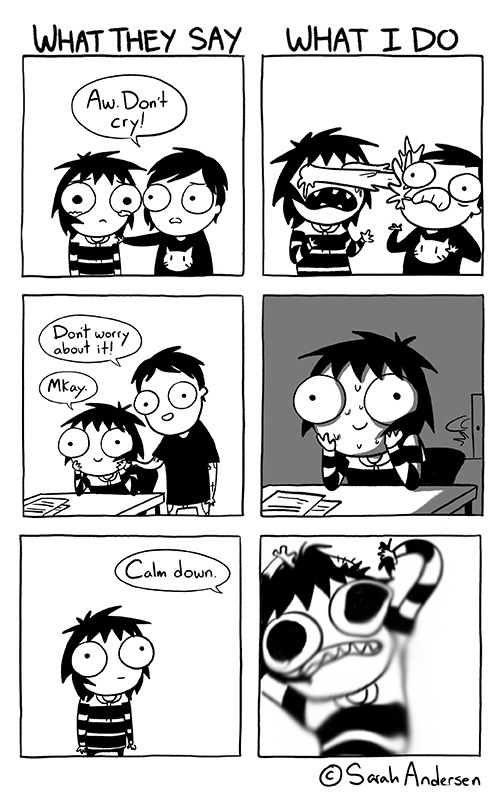this blog contains all the scraps I keep gathering in the doing of my studies. Things that have triggered a thought, a feeling, a connection or just an excuse for procrastination in the writing process. I am putting to work this habit of scraping quotes, clips, films, stories and the sort... can't explain it, just display this experimenting of my having a go with scraping as inquiry...
Don't wanna be here? Send us removal request.
Text
"Perhaps trouble need not carry such a negative valence. To make trouble was, within the reigning discourse of my childhood, something one should never do precisely because that would get one in trouble. The rebellion and its reprimand seemed to be caught up in the same terms, a phenomenon that gave rise to my first critical insight into the subtle ruse of power: the prevailing law threatened one with trouble, even put one in trouble, all to keep one out of trouble. Hence, I concluded that trouble is inevitable and the task, how best to make it, what best way to be in it." Judith Butler, Gender Trouble 1990 preface.
0 notes
Text
3 notes
·
View notes
Text
Hi y'all!
I’ve compiled a list of readings that speak to issues of nationalism, indigeneity, colonialism, and resistance/decolonization
The list is of course limited to what readings I’ve encountered at some point. They also come from a variety of academic disciplines and political movements (settler colonial studies, native studies, queer theory, postcolonial studies, feminist studies, trans studies).
And, with a few exceptions, these files were legally uploaded and shared… a lot of the time by the authors themselves, which I feel the need to point out because I love when authors can/do share their work online for free. (I say this not because I’m worried about the sanctity of ‘intellectual property’ but because I’m worried about things being deleted.)
Also re-linking to this list of pdf readings, “Natives Read Too,” from The Yáadihla Girls! human rights/war/nationalism/sovereignty
“What Do Human Rights Do?” by Talal Asad
“On Torture: Abu Ghraib by Jasbir Puar
”From Cold War to Trade War: Neocolonialism and Human Rights��� by Susan Koshy
”Necropolitics“ by Achile Mbembe
”Algeria Unveiled“ by Frantz Fanon
A Dying Colonialism by Frantz Fanon
History and Imperialism: A Century of Theory, from Marx to Postmodernism by Patrick Wolfe
Who Sings the Nation-State? Judith Butler and Gayatri Spivak
”Where Lawlessness is the Law: The Settler Colonial Frontier as a Legal Space of Violence“ by Julie Evans
”1492: a New World View“ by Sylvia Wynter
Frames of War by Judith Butler
”Purchase by Other Means: The Palestine Nakba and Zionism’s Conquest of Economics“ by Patrick Wolfe
Manifesting America: The Imperial Construction of U.S. National Space by Mark Rifkin
transnational/native/postcolonial feminisms & feminist critiques:
Woman, Native, Other: Writing Postcoloniality and Feminism - Trinh T. Minh-Ha
”Lynching, Empire, and Sexuality in Black Feminist Theory“ -Hazel V. Carby
”Transnational Feminist Pedagogy: An Interview with Inderpal Grewal and Caren Kaplan“
”Under Western Eyes: Feminist Scholarship and Colonial Discourses“ by Chandra Talpade Mohanty
”Feminist Problematizations of Rights Language“ by Jasbir Puar and Isabelle Barker
Feminist Genealogies, Colonial Legacies, Democratic Futures by M. Jacqui Alexander & Chandra Talpade Mohanty
”The Subject of Freedom“ by Saba Mahmood
The Spivak Reader
Borderlands/La Frontera by Gloria Anzaldúa
”Colonialism, Nationalism, and Colonialized Women: The Contest in India“ by Partha Chatterjee
”Can the Subaltern Speak?“ Gayatri Spivak
The Politics of the Veil - Joan W. Scott
”Decolonizing Feminism: Challenging Connections between Settler Colonialism and Heteropatriarchy“ by Maile Arvin, Eve Tuck, and Angie Morrill
”Native American Feminism, Sovereignty, and Social Change“ by Andrea Smith
decolonization, art, and resistance (not necessarily feminist):
Edward Said and Critical Decolonization
Culture and Resistance: Conversations with Edward W. Said
”Decolonization is not a Metaphor“ by Eve Tuck and K. Wayne Yang
”Decolonizing Antiracism“ by Bonita Lawrence and Enakshi Dua
Bury My Art at Wounded Knee / R.I.S.E
The Boarding School Healing Project
Center for Third World Organizing
Queers Against Israeli Apartheid
queer theory/sexuality studies/native studies/trans studies
Imperial Leather: Race, Gender, and Sexuality in the Colonial Contest by Anne McClintock
”Homonationalism As Assemblage: Viral Travels, Affective Sexualities“ by Jasbir Puar*
Conquest: Sexual Violence and American Indian Genocide by Andrea Smith
”Un-settling Settler Desires“ by Scott Morgensen Also the Unsettling America wordpress.
Race and the Education of Desire: Foucault’s History of Sexuality and the Colonial Order of Things - Ann Laura Stoler
”Romancing the Transgender Native: Rethinking the Use of the 'Third Gender’ Concept“ by Evan B. Towle and Lynn Morgan
”Transing and Transpassing Across Sex-Gender Walls in Iran.“ by Afsaneh Najmabadi
”Queer Settler Colonialism in Canada and Israel: Articulating Two-Spirit and Palestinian Queer Critiques“ by Scott Lauria Morgensen
”Queer Theory and Native Studies: The Heteronormativity of Settler Colonialism“ by Andrea Smith
*Actually just going to link to this page of Dr. Puar’s work because it’s great and relevant (and she also has a lot of work on Israel/Palestine). critiques of humanitarianism/developmentalism:
”Stealing the Pain of Others: Reflecting on Canadian Humanitarian Responses“ by Sherene H. Razack
“The Rationality of Empowerment: Microcredit, Accumulation by Dispossession, and the Gendered Economy” by Christine Keating, Claire Rasmussen, and Pooja Rish
“Reflections on Violence, Law, and Humanitarianism” by Talal Asad
“How to Write about Africa” by Binyavanga Wainaina
“Militarized Humanitarianism Meets Carceral Feminism: The Politics of Sex, Rights, and Freedom in Contemporary Antitrafficking Campaigns” by Elizabeth Bernstein
“Coca-Cola, Labor Restructuring and Political Violence in Colombia” Lesley Gill
[Really wish I knew more about this kind of work.]
Biopolitics, science, environmental justice
“Peversity, Contamination, and the Dangers of Queer Domesticity” -Nayan Shah
“Your DNA Is Our History:' Genomics, Anthropology, and the Construction of Whiteness as Property” by Jenny Reardon and Kim TallBear
“Displaying Sara Baartman” by Sadiah Qureshi
“The Biopolitics of Settler Colonialism: Right Here, Right Now” by Scott Morgensen
“Black Bodies, White Science” -Brian Wallis
The Violence of Green Revolution: Third World Agriculture, Ecology and Politics by Vandana Shiva
“The Seed and the Earth” by Vandana Shiva
“Earth Democracy: An Interview with Vandana Shiva”
“Putting knowledge in its place: science, colonialism, and the postcolonial” by Suman Seth
and…. U.S. politics
“Workfare–Warfare: Neoliberalism, 'Active’ Welfare and the New American Way of War” by Julie MacLeavy and Columba Peoples
“Women and Chile at the Alamo: Feeding U.S. Colonial Mythology” by Suzanne Bost
“The People of California are Suffering’: The Ideology of White Injury in Discourses of Immigration” by Lisa Marie Cacho
“American Studies without America: Native Feminisms and the Nation-State” by Andrea Smith
15K notes
·
View notes
Quote
They appeal to the state for protection, but the state is precisely that from which they require protection. To be protected from violence by the nation-state is to be exposed to the violence wielded by the nation-state, so to rely on the nation-state for protection from violence is precisely to exchange one potential violence for another.
Judith Butler, Frames of War (via philosophybits)
253 notes
·
View notes
Quote
“The question that preoccupies me in the light of recent global violence is, Who counts as human? Whose lives count as lives? And, finally, What makes for a grievable life?”
Judith Butler, Precarious Life: The Powers of Mourning and Violence (2006)
2K notes
·
View notes
Quote
Writing to touch with letters, with lips, with breath, to caress with the tongue, to lick with the soul, to taste the blood of the beloved body, of life in its remoteness; to saturate the distance with desire; in order to keep it from reading you.
Hélène Cixous, Coming to Writing and Other Essays (via nemophilies)
507 notes
·
View notes
Quote
We must learn to speak the language women speak when there is no one there to correct us.
Hélène Cixous (via coocoolah)
193 notes
·
View notes
Quote
But I will not glorify those aspects of my culture which injured me and which have injured me in the name of protecting me"
Gloria Anzaldúa in Borderlands/La Fronter: The New Mestiza. (via lentomanontroppo)
35 notes
·
View notes
Photo

February 2017 // Year of Creative Habits, Book II, pages 27-28
Day 33/365 of Year of Creative Habits. Painting of and quote by Gloria Anzaldúa.
118 notes
·
View notes
Quote
If the immutable character of sex is contested, perhaps this construct called ‘sex’ is as culturally constructed as gender; indeed, perhaps it is always already gender, with the consequence that the distinction between sex and gender turns out to be no distinction at all.
Judith Butler, Gender Trouble, 1990 This is the actual quotation. Like gender, sex is constructed and is not some fixed, pre-discursive state. In fact, sex is part of gender. (via pastel-hutt)
84 notes
·
View notes
Text
Judith Butler never said that “trans people aren’t real” wtf The (paraphrased) quotation “Sex is always already gender” means that: The construct of “sex,” which is the process of assigning infants as “male” or “female” based on what their genitals look like (or what we imagine that they should look like), is part of the larger institution of gender. Bodies have no meaning in themselves. Sex is the process of reading gendered meaning onto bodies. It serves to reify and essentialize gender. The entire reason why we have those two taxonomic categories, “male” and “female,” is so we can designate which children are “supposed” to become men or women. tl;dr: Butler’s point is that what we call “sex” is really the process by which we assign gender to people at birth and throughout their lives based on what their bodies look like. I think…I think some people are just seeing that quotation out of context, and maybe they aren’t familiar with Butler or with critical theory, and they’re assuming that it means “Your assigned sex dictates your gender.” That’s completely antithetical to everything that Butler actually says about what gender is and how it works.
964 notes
·
View notes
Photo












Jesse Williams just gave one of the most powerful speeches we’ve ever heard for Black Lives Matter
Watch the full speech to see why Samuel L. Jackson called it worthy of one of the great civil rights speeches of the 1960s.
Gifs: thg2nd
WATCH THE VIDEO
60K notes
·
View notes











